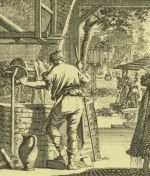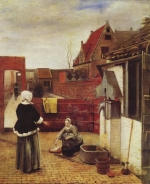Open publication
Fortunately, Leeuwenhoek lived at the first point in history when a medium was available for him to tell the world about his discoveries: the publications of the Royal Society in London. He wrote on June 12, 1716:
Whenever I found out anything remarkable, I have thought it my duty to put down my discovery on paper, so that all ingenious people might be informed thereof.
There was another motive for Oldenburg when he established Philosophical Transactions. Until then, the main means of scientific communication was the learned letter copied and passed by mail through networks of interested people throughout Europe.
 In this intense social network, self-proclaimed even then as the Republic of Letters, there was much opportunity for disputes about priority of discovery. Philosophical Transactions, with print runs early on in excess of a thousand copies, distributed dated, exact copies of these learned letters all over Europe.
In this intense social network, self-proclaimed even then as the Republic of Letters, there was much opportunity for disputes about priority of discovery. Philosophical Transactions, with print runs early on in excess of a thousand copies, distributed dated, exact copies of these learned letters all over Europe.
According to Bishop Sprat's 1667 History of the Royal Society, (frontispiece, left) members of this new society spurned:
amplifications, digressions, and swellings of style ... bringing all things as near the Mathematical plainness, as they can: and preferring the language of Artizans, Countrymen, and Merchants, before that, of Wits and Scholars.
For Leeuwenhoek, the English versions of his letters in Philosophical Transactions and translations from English into French for the Journal des Scavans was not enough. Leeuwenhoek published 165 of his own letters in parallel Dutch and Latin versions. They were printed in Leiden and Delft and most of them were never published elsewhere during his lifetime. (See the Publications page.)
He made no attempt to trim, rearrange, or otherwise systematize his work beyond rough chronological groupings and freshly engraved illustrations. Today, he would no doubt find blogging most congenial. He felt strongly that revealing his observations and the results of his experiments was worthwhile. In that same letter of June 12, 1716, Leeuwenhoek wrote:
My work, which I've done for a long time, was not pursued in order to gain the praise I now enjoy, but chiefly from a craving after knowledge, which I notice resides in me more than in most other men.
Collected, his hundreds of letters run to hundreds of thousands of words, plus hundreds of illustrations, each published in two or three languages, many of them in the most prestigious journal of the time, and distributed as widely as possible. He had, of course, a long life and a constant output, but Leeuwenhoek nevertheless out-published most of his peers, just in terms of quantity.















